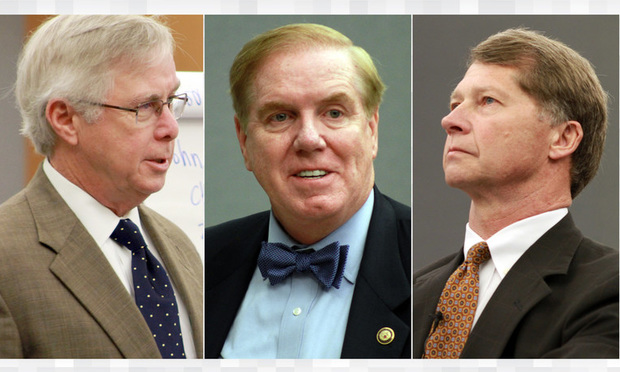Plaintiffs Lawyers Move for Sanctions in Ford Roof Crush Trial
The 24-page motion to strike Ford's defense accuses local counsel—Dentons' partner Randy Evans—of “nothing more than a hapless, mean-spirited and unhinged personal attack that ignored all of the evidence” and violated court orders.
April 03, 2018 at 12:41 PM
5 minute read

Lawyers representing the family suing for wrongful death in a rollover crash have asked Gwinnett County State Court Judge Shawn Bratton to sanction Ford Motor Co. with the civil equivalent of the death penalty.
Meanwhile, Ford has asked for a directed verdict in its favor. The automaker has also filed a motion to compel disclosures that could shut down the trial and move it to Forsyth County, where the automaker has a corporate agent. The motion to compel suggests that settlements with two other defendants—Cooper Tire Co. and The Pep Boys—could cause the venue in Gwinnett to vanish. Cooper made the tire that caused the crash when it blew out. Pep Boys installed the wrong tire, according to records from both sides. But Ford is the only defendant remaining.
Bratton has not granted those motions, and the battle continues into the third week of trial for the lawsuit filed by the sons of Melvin and Voncile Hill. The Hills were killed when their Ford F250 Super Duty pickup truck rolled over and its roof flattened.
The 24-page motion to strike Ford's answer to the lawsuit accuses local counsel—Dentons' partner Randy Evans—of “nothing more than a hapless, mean-spirited and unhinged personal attack that ignored all of the evidence” and violated court orders on rules for the trial.
That dispute—one of many in the trial—is over Evans' cross-examination of the plaintiff's medical examiner, Dr. Jonathan Eisenstat, on Friday. Eisenstat is chief medical examiner for the GBI, but his role in the trial is private, hired on by the plaintiffs to examine the bodies and talk about their neck injuries from the crash. Evans brought up a toxicology report—even though it showed no alcohol or drugs other than prescribed doses of medicine. And he mentioned pain pills in a tangential fashion, asking about the medical examiner's office being especially busy because of the opioid crisis.
“This court ordered—multiple times—that Ford could not argue or suggest driver error or fault on the part of Mr. Hill. … This included any suggestion that Mr. Hill was impaired while driving his truck on April 3, 2014. On Friday, March 30, Ford intentionally and flagrantly violated the court's orders and admonitions that Ford was prohibited from 'going' exactly where Ford 'went,'” the motion said.
“Evans published a highlighted copy of Mr. Hill's GBI toxicology report to the jury and stated before the jury, among other things, that: [T]hese medications within their therapeutic dosages can impact performance whether or not you are driving a truck or walking down the road,” the motion said.
The motion said Evans' cross-examination of the medical examiner has “tainted” the entire trial. “If this court does not act and strike Ford's answer, Ford's misconduct will have procured exactly what Ford wanted—for the jury to falsely believe that Mr. Hill was some type of dope head,” the motion said.
The motion was signed by the Hills' lawyers: Jim Butler, Brandon Peak, David Rohwedder and Chris McDaniel of Butler Wooten & Peak in Columbus and Atlanta; Michael Gray of Walker, Hulbert, Gray & Moore in Perry; and Gerald Davidson Jr. of Mahaffey Pickens Tucker in Lawrenceville, where the trial is taking place.
Ford's lead counsel is D. Alan Thomas of Huie, Fernambucq & Stewart in Birmingham, Alabama. His co-counsel, Paul Malek, has tried many other Ford cases with him. Their local counsel in this case and many others is Mike Boorman of Huff, Powell & Baily, working with Audrey Berland. But for this case, Ford added another local counsel: Evans.
None of the Ford lawyers offered any comment on the motion for the record.
Butler said only this: ”Meanness and deceit may work in politics but should have no place in the law.”
Evans' cross-examination of the medical examiner Friday can be seen on Courtroom View Network, which is showing the entire trial live streamed on the website and archived in videos for each day.
When Evans began, he introduced himself to the jury, since it was his first time to speak in their presence. Evans identified himself as “the son of J.C. and Betty Evans in Warner Robins,” not far from where the Hills lived.
Evans did not mention that he is a leader in the national Republican party and that he is awaiting confirmation by the U.S. Senate as President Donald Trump's nominee to be ambassador to Luxembourg or that he co-chairs Gov. Nathan Deal's Judicial Nominating Commission, which selected Bratton for the bench.
Because of the ambassadorship nomination, Evans has had to make financial disclosures of his own. He was paid $2.8 million between Jan. 1, 2016, and June 23, 2017—roughly $1.78 million annually, plus bonuses.
But on Friday he was questioning Eisenstat about what he makes as a medical examiner: $250,000 a year.
“That's a lot of money,” Evans said. “Yes, it is a lot of money,” Eisenstat answered.
Then Evans questioned Eisenstat about what he makes in his personal time working for plaintiffs: $4,500 each for exhumation such as he did for the Hills, plus that much again per day of trial testimony.
And Evans alleged in the cross that Butler had tried to use Eisentat's GBI connection “to collect money” with the lawsuit.
Butler objected so often that the judge lost count. And each time Ford countered.
“I can't keep up with the objections,” Bratton said. “I cannot do it. There is an objection to every objection, and then an objection to that. We have to keep this on the rails. Let's move forward.”
The case is Hill v. Ford, No. 16 C 04179-2.
This content has been archived. It is available through our partners, LexisNexis® and Bloomberg Law.
To view this content, please continue to their sites.
Not a Lexis Subscriber?
Subscribe Now
Not a Bloomberg Law Subscriber?
Subscribe Now
NOT FOR REPRINT
© 2025 ALM Global, LLC, All Rights Reserved. Request academic re-use from www.copyright.com. All other uses, submit a request to [email protected]. For more information visit Asset & Logo Licensing.
You Might Like
View All
Law Firms Expand Scope of Immigration Expertise Amid Blitz of Trump Orders
6 minute read
Bass Berry & Sims Relocates to Nashville Office Designed to Encourage Collaboration, Inclusion
4 minute read
Gunderson Dettmer Opens Atlanta Office With 3 Partners From Morris Manning
3 minute read
Trending Stories
Who Got The Work
J. Brugh Lower of Gibbons has entered an appearance for industrial equipment supplier Devco Corporation in a pending trademark infringement lawsuit. The suit, accusing the defendant of selling knock-off Graco products, was filed Dec. 18 in New Jersey District Court by Rivkin Radler on behalf of Graco Inc. and Graco Minnesota. The case, assigned to U.S. District Judge Zahid N. Quraishi, is 3:24-cv-11294, Graco Inc. et al v. Devco Corporation.
Who Got The Work
Rebecca Maller-Stein and Kent A. Yalowitz of Arnold & Porter Kaye Scholer have entered their appearances for Hanaco Venture Capital and its executives, Lior Prosor and David Frankel, in a pending securities lawsuit. The action, filed on Dec. 24 in New York Southern District Court by Zell, Aron & Co. on behalf of Goldeneye Advisors, accuses the defendants of negligently and fraudulently managing the plaintiff's $1 million investment. The case, assigned to U.S. District Judge Vernon S. Broderick, is 1:24-cv-09918, Goldeneye Advisors, LLC v. Hanaco Venture Capital, Ltd. et al.
Who Got The Work
Attorneys from A&O Shearman has stepped in as defense counsel for Toronto-Dominion Bank and other defendants in a pending securities class action. The suit, filed Dec. 11 in New York Southern District Court by Bleichmar Fonti & Auld, accuses the defendants of concealing the bank's 'pervasive' deficiencies in regards to its compliance with the Bank Secrecy Act and the quality of its anti-money laundering controls. The case, assigned to U.S. District Judge Arun Subramanian, is 1:24-cv-09445, Gonzalez v. The Toronto-Dominion Bank et al.
Who Got The Work
Crown Castle International, a Pennsylvania company providing shared communications infrastructure, has turned to Luke D. Wolf of Gordon Rees Scully Mansukhani to fend off a pending breach-of-contract lawsuit. The court action, filed Nov. 25 in Michigan Eastern District Court by Hooper Hathaway PC on behalf of The Town Residences LLC, accuses Crown Castle of failing to transfer approximately $30,000 in utility payments from T-Mobile in breach of a roof-top lease and assignment agreement. The case, assigned to U.S. District Judge Susan K. Declercq, is 2:24-cv-13131, The Town Residences LLC v. T-Mobile US, Inc. et al.
Who Got The Work
Wilfred P. Coronato and Daniel M. Schwartz of McCarter & English have stepped in as defense counsel to Electrolux Home Products Inc. in a pending product liability lawsuit. The court action, filed Nov. 26 in New York Eastern District Court by Poulos Lopiccolo PC and Nagel Rice LLP on behalf of David Stern, alleges that the defendant's refrigerators’ drawers and shelving repeatedly break and fall apart within months after purchase. The case, assigned to U.S. District Judge Joan M. Azrack, is 2:24-cv-08204, Stern v. Electrolux Home Products, Inc.
Featured Firms
Law Offices of Gary Martin Hays & Associates, P.C.
(470) 294-1674
Law Offices of Mark E. Salomone
(857) 444-6468
Smith & Hassler
(713) 739-1250






